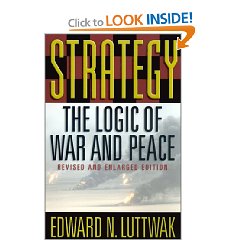My own discovery of how the threat changes depending on the levels of analysis would not have occurred without this brilliant book by Edward Luttwak. It was his careful and reasoned discussion of how specific capabilities and policies might not make sense at one level of analysis, but do when combined with others, that helped me understand why US (and other) intelligence communities continue to get so much wrong.
First to credit Luttwak: anti-tank weapons make no sense in isolation (tactical level), but if they slow the tank down enough to allow artillery and close air support to have an impact (operational level), they might close gaps and win victories (strategic level). Bottom line: nothing in war can be considered in isolation (including, one might add, the post-war needs that enable an exit strategy).
It was from Luttwak's work that the Marine Corps Intelligence Center (today the Marine Corps Intelligence Command) developed the new model for analysis that distinguished between the four levels of analysis (strategic, operational, tactical, and technical), combined that with the three major domains (military, geographic, and civil), and then cross-walked that against every single mission area (infantry, artillery, tanks, aviation, etcetera).
One simple example of the importance of Luttwak's work to intelligence: at the time (1990) the Libyan T-72 tank was considered by the US Intelligence Community to be a very high threat because it was the best tank that money could then buy–but on reflection, we found this was true only at the technical level of optimal lethality. At the tactical level the tank was being stored in the open, poorly maintained by poorly trained crews, parts cannibalization occurring regularly, this dropped the threat to low. At the operational level there were a significant number of the tanks scattered around and available, this raised it to a medium threat at that level. At the strategic level, the tanks could not be sustained in battle for more than two weeks, and dropped again to low.
Edward Luttwak, in company with Colin Gray, Martin van Creveld, Ralph Peters, and Steve Metz, is one of the most brilliant and clear-spoken of the strategists writing in English, and this book will remain–for years to come–a fundamental building block in the learning and maturation of national security strategy.
Other recommended books at this level:
Modern Strategy
Transformation of War
The Changing Face of War: Lessons of Combat, from the Marne to Iraq
Wars of Blood and Faith: The Conflicts That Will Shape the 21st Century
Security Studies for the 21st Century
Strategy: Process, Content, Context–An International Perspective
The Search for Security: A U.S. Grand Strategy for the Twenty-First Century
The Sword and The Pen – Selections From The World's Greatest Military Writings
War and Peace and War: The Rise and Fall of Empires





